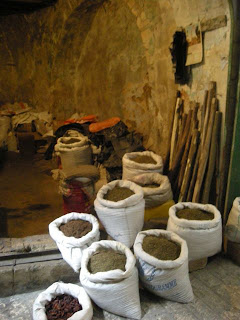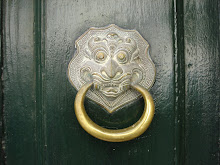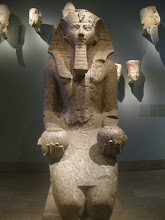I never thought I'd say this, but I almost miss the Israeli checkpoint soldiers. Not, obviously, because they're particularly friendly, but because they gave me stuff to write about in my blog.
What do I write now that I'm back in Sweden? About a rude person in the subway? Rainy summer days?
Or the two holes in my heart, perhaps.
Yes. I have two holes in my heart. When I left Egypt many years ago, it was as if a corner of my heart had attached itself to the great city of Cairo and as the plane lifted, I could feel a small hole rip open as that part of my heart refused to let go.
For years now, I have had that small hole that just won't go away no matter how much I try to fill it with longing, Egyptian music, and dreams of returning one day.
I do sometimes. Return. And every time I leave, it's as if that little hole gets torn open all over again and let out all the longing I put there.
A few weeks ago, I tore a new hole in my heart when I left Palestine. I think I got caught in the sabr, the patient cactus whose thick, thorny body can be cut down, but whose roots refuse to leave the soils of Palestine. No matter how many Jewish hands try to dig up and uproot Palestinian history in the land.
I think my heart got caught in the sabr on the way from my old hometown Ramallah to Areeha, and when I reached the border control manned by Israeli guards and soldiers, it was bleeding into the sands that hide mines and memories of war and conquest.
And here I sit at the kitchen table at my parents' house in Sweden with two holes in my heart and so much longing that I'm not sure what to do with it all.
So I bake Palestinian bread with zaatar and cook Palestinian rice dishes that I turn upside down and call maqloobeh. And I read. I read a book by Susan Abulhawa called Mornings in Jenin and cry more than I can remember crying over a book for a very long time. In it is all the longing of all the Palestinians made refugees by the Jewish war for independence in 1948 and the Israeli war of conquest in 1967. A longing for a homeland lost, a longing for sisters and brothers, mothers and fathers killed, and I feel it ache in my heart too. Not because I lost anything really, but because I have these two holes in my heart that, when I come to think of it, have always been there. Or the longing for something has, anyway.
And do you know what else I do? I go through old things to make room for new things. And I find old poems that I wrote when I was 13 and 18, and songs and short stories and even books that I wrote and I wonder at my own imagination and wonder where it went. Could I write something like that now?
And then, then I almost mourn the loss of my old dreams that I left along the way. I will never be a singer songwriter now, I won't write fiction again, I think, and I almost never write in my diary anymore. And I think, "Is this what it is to finally grow up?" You apply for jobs you don't really want, move home even though you don't really want to, you do things for people because you don't want to disappoint them, and then you sit with no energy left for the things you think you really want to do. And the thing is that you stop really wanting to do them anyway, because it no longer matters.
But then I think it's just the going-back-to-Sweden blues. And maybe I'll pick up the guitar and do what I always used to do: turn my sadness and longing into songs so as not to waste all the energy that goes into feeling less-than-fantastic.
Maybe there will be a line for the soldier that pointed the gun at me in Al-Khalil, but then maybe there won't. Because why should I honor those who don't even honor the lives of their neighbors with words that pour out from the two holes in my heart?

What do I write now that I'm back in Sweden? About a rude person in the subway? Rainy summer days?
Or the two holes in my heart, perhaps.
Yes. I have two holes in my heart. When I left Egypt many years ago, it was as if a corner of my heart had attached itself to the great city of Cairo and as the plane lifted, I could feel a small hole rip open as that part of my heart refused to let go.
For years now, I have had that small hole that just won't go away no matter how much I try to fill it with longing, Egyptian music, and dreams of returning one day.
I do sometimes. Return. And every time I leave, it's as if that little hole gets torn open all over again and let out all the longing I put there.
A few weeks ago, I tore a new hole in my heart when I left Palestine. I think I got caught in the sabr, the patient cactus whose thick, thorny body can be cut down, but whose roots refuse to leave the soils of Palestine. No matter how many Jewish hands try to dig up and uproot Palestinian history in the land.
I think my heart got caught in the sabr on the way from my old hometown Ramallah to Areeha, and when I reached the border control manned by Israeli guards and soldiers, it was bleeding into the sands that hide mines and memories of war and conquest.
And here I sit at the kitchen table at my parents' house in Sweden with two holes in my heart and so much longing that I'm not sure what to do with it all.
So I bake Palestinian bread with zaatar and cook Palestinian rice dishes that I turn upside down and call maqloobeh. And I read. I read a book by Susan Abulhawa called Mornings in Jenin and cry more than I can remember crying over a book for a very long time. In it is all the longing of all the Palestinians made refugees by the Jewish war for independence in 1948 and the Israeli war of conquest in 1967. A longing for a homeland lost, a longing for sisters and brothers, mothers and fathers killed, and I feel it ache in my heart too. Not because I lost anything really, but because I have these two holes in my heart that, when I come to think of it, have always been there. Or the longing for something has, anyway.
And do you know what else I do? I go through old things to make room for new things. And I find old poems that I wrote when I was 13 and 18, and songs and short stories and even books that I wrote and I wonder at my own imagination and wonder where it went. Could I write something like that now?
And then, then I almost mourn the loss of my old dreams that I left along the way. I will never be a singer songwriter now, I won't write fiction again, I think, and I almost never write in my diary anymore. And I think, "Is this what it is to finally grow up?" You apply for jobs you don't really want, move home even though you don't really want to, you do things for people because you don't want to disappoint them, and then you sit with no energy left for the things you think you really want to do. And the thing is that you stop really wanting to do them anyway, because it no longer matters.
But then I think it's just the going-back-to-Sweden blues. And maybe I'll pick up the guitar and do what I always used to do: turn my sadness and longing into songs so as not to waste all the energy that goes into feeling less-than-fantastic.
Maybe there will be a line for the soldier that pointed the gun at me in Al-Khalil, but then maybe there won't. Because why should I honor those who don't even honor the lives of their neighbors with words that pour out from the two holes in my heart?





































